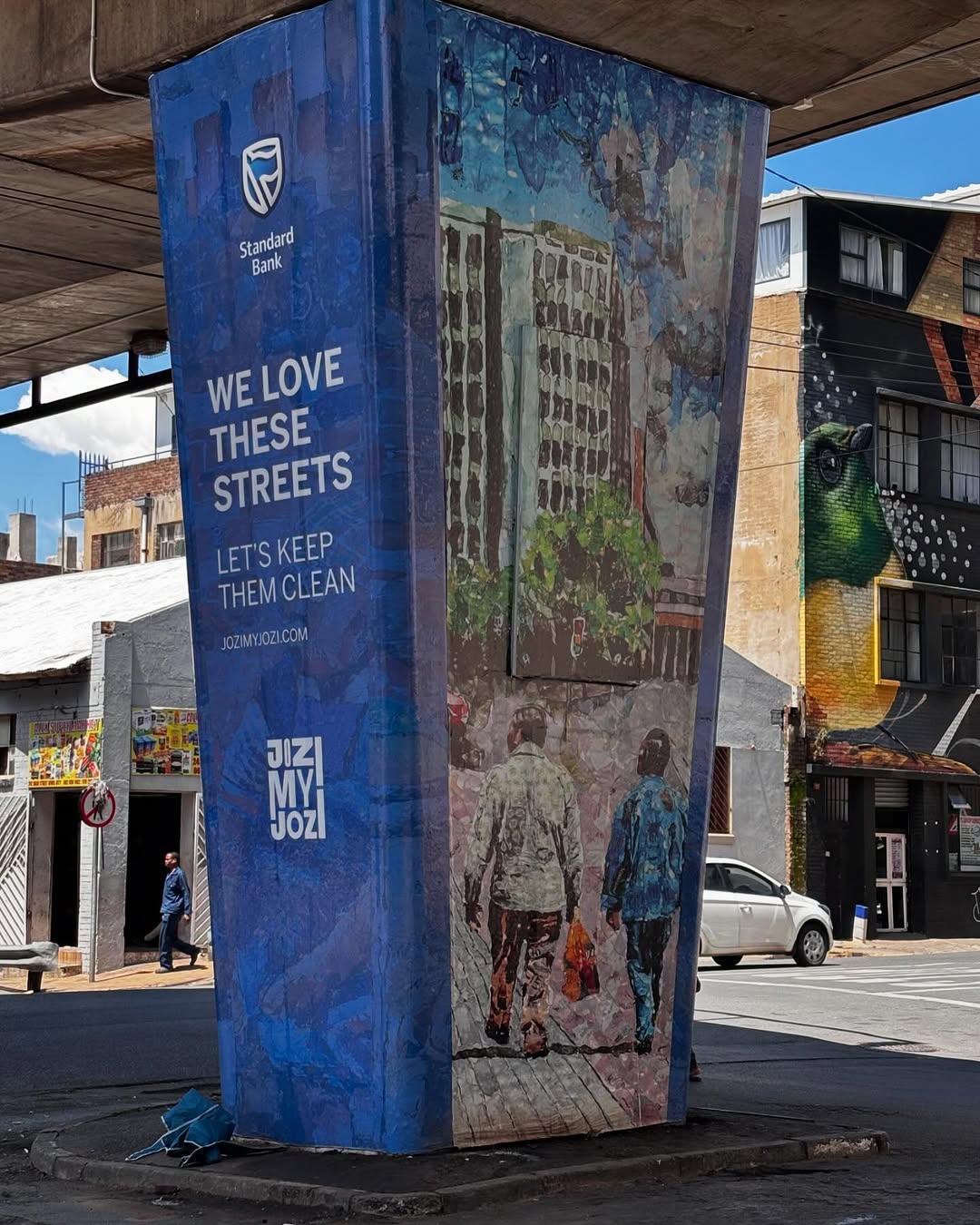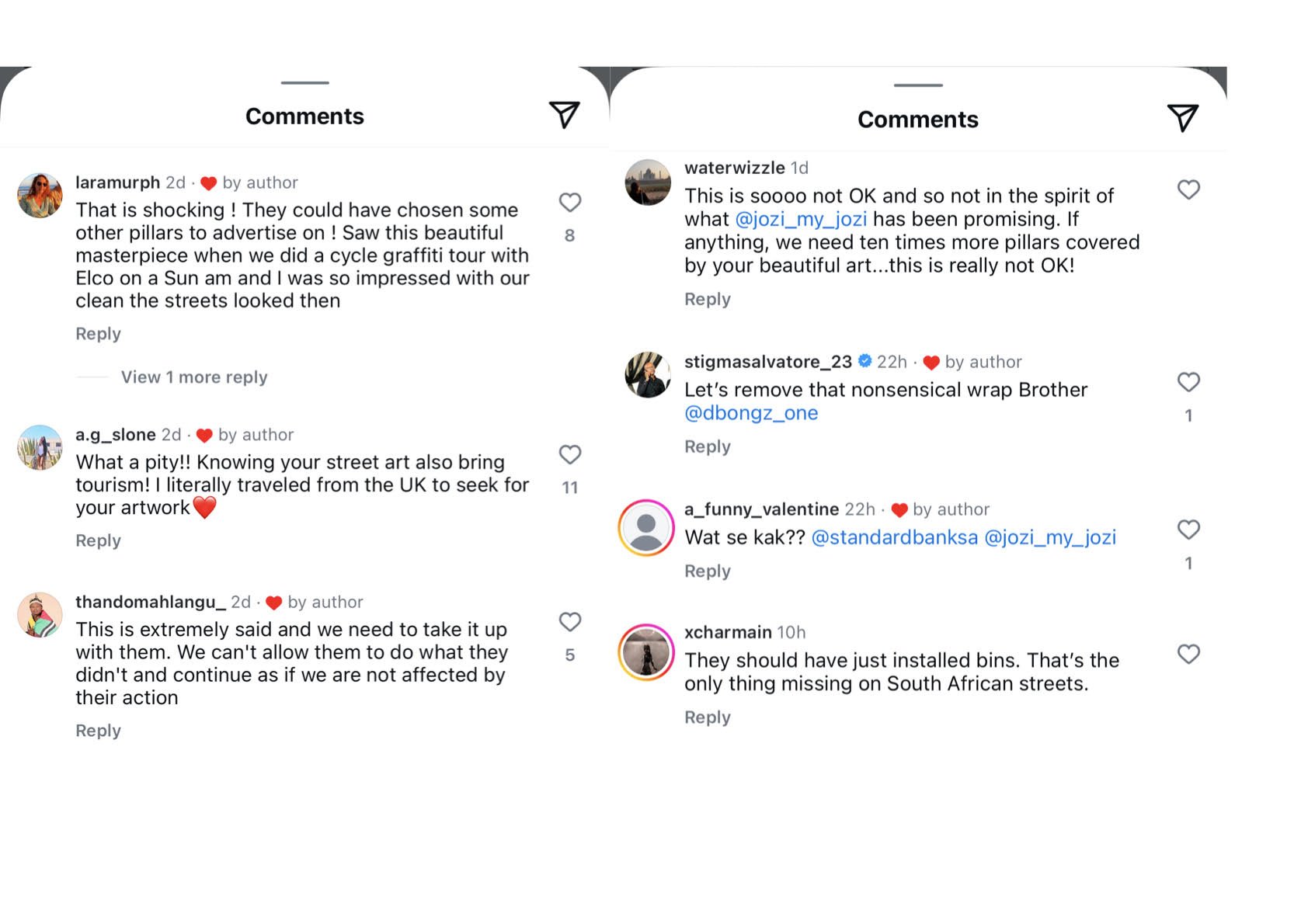The Standard Bank wraps declared "We Love These Streets". The design included the logo of nonprofit organisation Jozi My Jozi, with whom the bank has partnered on several initiatives to clean the City Centre.
Further complicating matters, the ads featured artworks by Mbongeni Buthelezi created with trash from these same weekly street clean-ups. We followed Buthelezi's journey through the city and wrote about this artwork, and know that everything about Buthelezi's practice communicates his deep respect and love for the city. So where did it all go wrong?

This instance of corporate erasure has wound up implicating parties who claim to have wanted no part in it. To be frank, it comes off as distasteful at worst, and misguided at best. It also raises all kinds of questions about intention, buy-in, and responsibility. And, understandably, it's caused widespread upset.
To quote Tsheps in her original post: "My heart is sore. My favourite piece by my favourite artist is now covered. I’m sure the intentions are good, but there was nothing ugly and needing cover about that work of art."
In response, @jozi_my_jozi offered: "We approached Standard Bank immediately when they did this and drew their attention to what they had covered. This was their campaign executed by their advertising agency. They were sold the space for three months and were supposed to remove it at the end of the lease period. We will follow up with them and ensure it’s removed. It’s a wrap so the artwork should not be damaged."
Unfortunately, while the wraps have since been removed, Dbongz's artwork has not remained unscathed. The damage looks quite substantial, seen in photographs posted by Tsheps on Wed, Jan 22 of the uncovered pillar.
What does the artist say? On Mon, Jan 20, Dbongz shared a post on Instagram: "Are the streets being cleaned of us? What’s interesting is that Standard Bank and Jozi My Jozi thought it’s a good idea to wrap the only three clean and freshly painted pillars and leave an entire street with dirty pillars and claim they are cleaning the streets. Are we the filth, or perhaps our art is. Incredibly, these are the same organisations that are supposedly championing art. While at the same time suffocating the voices of artists in the street. And at the very same time spewing on the legacy ka Gog’Esther Mahlangu, whom we had honoured here while she is still alive and publicly archive her legacy and heritage. But hey, was it ever about the people? When has it ever been?" At the time of writing, more than 1,400 people have engaged publicly with this post, leaving upwards of 100 comments (Jan 22, 2025).
We approached Standard Bank for comment. "The media owner has confirmed that the incorrect placement of the installation was an unfortunate error on their part. They have since removed the installation and are in direct communication with the artist," we were told by public relations lead Obakeng Mooke.
We followed the trail to Keys Communication, the marketing agency contracted by Standard Bank. Founder and owner Anisa Kale-Ngwapa said: "Please be advised that we use wall vinyl with self-adhesive glue which is standard on all print work of this type. While we cannot confirm that the damage to Dbongz artwork was because of our installation, we have offered Dbongz material to restore his mural."
This city is a complex patchwork of communities, and it is one in which, without official stewards, there is no ultimate ownership. It's also a space in which the streets and the boardrooms don't meet easily. Those who inhabit the city and those who decide on its future sometimes appear to occupy two different planets.

Many who commented on Dbongz's post expressed their horror at seeing his contribution to the city being erased in such a cavalier fashion, ironically by a campaign designed to inculcate a sense of ownership for the city, and one that is an honourable call to action to take care of its streets. In a weird turn of events, the important messaging to not trash the city ended up doing just that. But if we are to be here, all in this leaky boat together, we at Johannesburg In Your Pocket want to make a case for stopping, listening, and learning, rather than leaping to conclusions and pressing the cancel button. This city needs us all to save it.
Having worked with Standard Bank in the past, we don't doubt their intention – as Dbongz highlights, Standard Bank has an incredible track record of championing the arts. The Standard Bank Young Artist Award, in place since 1981, is a shining example.
What we know from years of being part of this mix and navigating between these spaces is that there will always be folly in treating the living and breathing thing that is the city as a blank slate to be emblazoned or bettered with corporate logos. While the future of the Johannesburg Art Gallery (JAG) hangs in the balance, the Joburg City Library has been closed since the start of the Covid era, and the Rissik Street post office is a shell, it is Joburg's street artists who have all the while created attractions that people want to visit. Even fuelling a tourist economy. The kind of work Dbongz and others like him do actually makes our streets safer.
To create positive change, one must nurture and support the champions; those who contribute to a better city every day, often at a cost to themselves. The incident is a red flag that we cannot ignore if we want to protect the fragile things that add beauty to what is a broken-down city, as well as if we want to seek direction and work together with those who know these streets.


_m.jpg)
_m.jpg)
_m.jpg)


Comments